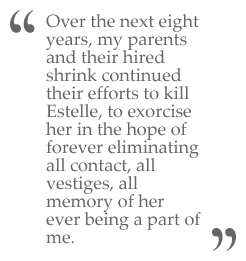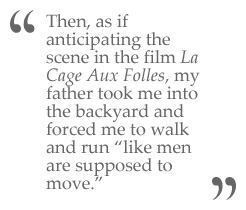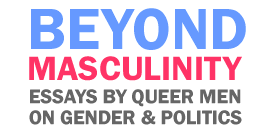
i, I am a gay man and my name is Warren Blumenfeld, or
as my friends like to affectionately call me, “Estelle
Abrams” — honorary Jewish bisexual woman from Brooklyn.
I informally adopted that name after a friend told me
that I looked like a woman that his mother played Bridge
with. Actually, though, Estelle embodies the feminine
side of my soul—my joyous, playful self – the creative,
spontaneous, sensitive spirit that I have come to
treasure and genuinely love.
But this wasn’t always the case. When I was quite young,
long before I learned what were considered the “proper”
rules of conduct, I naively introduced Estelle to my
classmates and my neighbors. I was quick to discover
that they feared and even despised her. Children called
her names with an incredible vehemence and malice that I
did not understand.
 Adults hated her too. After I introduced Estelle to my
parents, they quickly scheduled my first appointment
with a child psychiatrist when I was only four years
old. Over the next eight years, my parents and their
hired shrink continued their efforts to kill Estelle, to
exorcise her in the hope of forever eliminating all
contact, all vestiges, all memory of her ever being a
part of me.
Adults hated her too. After I introduced Estelle to my
parents, they quickly scheduled my first appointment
with a child psychiatrist when I was only four years
old. Over the next eight years, my parents and their
hired shrink continued their efforts to kill Estelle, to
exorcise her in the hope of forever eliminating all
contact, all vestiges, all memory of her ever being a
part of me.
It was the early 1950s, the so-called “McCarthy Era”—a
conservative time, a time when difference of any sort
was viewed with suspicion. On the floor of the U.S.
Senate, a brash young Senator from Wisconsin, Joseph
McCarthy, sternly warned that “Communists [often thought
of as Jews in the public imagination] corrupt the minds
and homosexuals corrupt the bodies of good upstanding
Americans,” and he proceeded to have gays and lesbians
officially banned from any government service. To
McCarthy, Jews, homosexuals, and Communists were one and
the same.
For lesbian, gay, bisexual, and transgender (LGBT)
U.S.-Americans during this era, police frequently raided
their bars, which were usually Mafia owned; the U.S.
Postal Service raided LGBT organizations and even
published the names of their mailing lists in local
newspapers; and people regularly lost their jobs for
being “exposed” as queer. LGBT people were often
involuntarily committed to mental institutions and
underwent painful electro-shock therapy; some were even
lobotomized (if you’re unfamiliar, this means that
doctors removed the frontal lobes of their brains).
Not knowing what else to do at this time with what they
considered to be my gender non-conformity, my parents
sent me to a child psychologist because they feared that
I might be gay (or to use the terminology of the day,
“homosexual”). There was a basic routine in the
“therapy” sessions. I walked into the psychologist’s
office, took off my coat and put in on the hook behind
the door. The psychologist then asked me if there was
anything in particular that I wanted to discuss. I
invariably said “no.” Since I did not understand why I
was there in the first place, I surely did not trust him
enough to talk candidly with him. When I was less than
forthcoming in our conversations (which was on most
occasions), he would take down from the shelf a model
airplane or a boat or a truck, and we would spend the
remainder of the hour assembling the pieces with glue.
In private sessions with my parents, he told them that
he wanted me to concentrate on behaviors and activities
associated with males, while of course avoiding those
associated with females. He instructed my parents to
assign me the household chores of taking out the
garbage, mowing the lawn (even though we lived in an
apartment building and we did not have a lawn), and not
washing or drying the dishes. Also, I was forbidden to
play with dolls or to cook. And – as if this all was not
enough – he advised my parents to sign me up for a
little league team, which, despite my hatred for the
sport, I joined for two summers.
If I learned anything during my time with the
psychologist, it was that I should cloak Estelle from
the sun’s exposing rays – to keep her well concealed
deep within my consciousness, only to be resurrected
during those rare but precious moments of solitude. It
wasn’t long after my sessions with the psychologist
began that I began to be convinced that there was indeed
something wrong with me. Why else would my parents be
sending me, trying desperately to change me, my
“mannerisms,” my interests, my likes, and even my
dislikes?
 “When you wave,” my father sternly warned one afternoon
on the front steps of our apartment building when I was
eight years old, “you MUST move your whole hand at the
same time. Don’t just move the fingers up and down like
you’re doing.” He grabbed my arm, and despite my
free-flowing tears and cheeks pink with shame, he
vigorously demonstrated the “proper” hand wave for a
man. Then, as if anticipating the scene in the film
La Cage Aux Folles (and the U.S. remake The
Birdcage), my father took me into the backyard and
forced me to walk and run “like men are supposed to
move.” Obviously, I had previously been doing something
wrong. “Of course the other children pick on you,” he
blamed. “You do act like a girl.” I was
humiliated.
“When you wave,” my father sternly warned one afternoon
on the front steps of our apartment building when I was
eight years old, “you MUST move your whole hand at the
same time. Don’t just move the fingers up and down like
you’re doing.” He grabbed my arm, and despite my
free-flowing tears and cheeks pink with shame, he
vigorously demonstrated the “proper” hand wave for a
man. Then, as if anticipating the scene in the film
La Cage Aux Folles (and the U.S. remake The
Birdcage), my father took me into the backyard and
forced me to walk and run “like men are supposed to
move.” Obviously, I had previously been doing something
wrong. “Of course the other children pick on you,” he
blamed. “You do act like a girl.” I was
humiliated.
For most of my years in school, I was continually beat
and attacked by my peers who perceived me as someone who
was “different.” Names like “queer,” “little girl,” and
“fag” targeted me like the big red dodgeball my
classmates furiously hurled at one another on the
schoolyard. I would not – and could not – conform to the
gender roles that my family and peers so clearly
expected of me, and I regularly paid the price... (continue reading)




2 COMMENTS ON THIS ESSAY:
I just loved Estelle and your vision...
Thank you for sharing it with all of us! :)
п»ї
Great page. Good stuff.